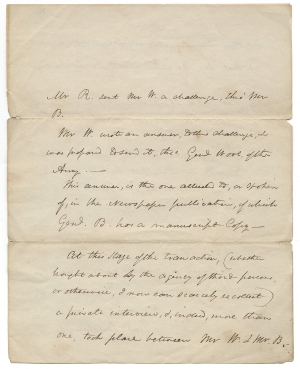|
Daniel Webster Details a Duel Challenge by Senator John Randolph |
Click to enlarge:

Select an image:
Randolph twice challenged the venerable Congressmen Daniel Webster. The first was in 1816, when Randolph felt scorned by Webster’s speech in a House debate over sugar duty. The second, relating to this document, was in 1825, after Randolph had seethed for eight months over Webster denying William H. Crawford “the fullest opportunity to answer the charges against him” during the election of 1824. (Register of Debates, 18th Congress, 2nd Session, 56-58). In the second challenge, Senator Thomas Hart Benton delivered Randolph’s dare to Webster while the House was in session.
Mutual friends intervened on both challenges and attempted to resolve the matters as quietly as possible. In the end, Randolph withdrew both challenges. Historians believe that Benton played an important role in resolving the second conflict. In 1826, after insulting Secretary of State Henry Clay on the Senate Floor, Randolph accepted Clay’s challenge, which subsequently took place but concluded with a handshake.
The date of this manuscript must be 1826 or later as it refers to “then Senator Lloyd.” It doesn’t mention Lloyd’s death in 1831.
DANIEL WEBSTER.
Autograph Manuscript. Ca. 1826-1831. 2 pp.
Inventory #24221
Price: $9,500
Transcript
Mr. R sent Mr. W. a challenge, thro’ Mr. B.
Mr. W. wrote an answer, to this challenge, and was prepared to send it, thro. Genl Wool, of the Army.
This answer, is the one alluded to, or spoken of, in the newspaper publication, of which Genl. B. has a manuscript copy.
At this stage of the transaction, whether brought about by the agency of third persons, or otherwise, I now can scarcely recollect a private interview, and, indeed, more than one, took place between Mr. W and Mr. B. <2> at these interviews, it was finally arranged;
1. That Mr. R. should withdraw the challenge
2. That Mr. W. should destroy his answer, and keep no copy.
3. That, therefore, Mr. B. should be at liberty to say to Mr. R. that Mr. W. did not intend, in what he said, to impeach Mr. R’s personal veracity.
4. That neither party should make, or authorize any publication, respecting the transaction.
Genl. Breckenridge may be <3> assured that the forgoing is an accurate short statement of the agreement. My copy of the writing is at Boston-
I destroyed my letter, according to agreement; I left no copy. From that day to this; I do not know that I have spoken of its contents to friends. As contents were known to Mr. Lloyd, then Senator of Massachusetts, Genl Wool, and one other Gentlemen. I principally conferred, in relation to the whole transaction, in all its stages, with Mr. Lloyd. I have scrupulously fulfilled my part of the agreement, as to not authorizing any publications.
Historic Background
John Randolph (1773-1883) of Roanoke, Virginia was infamous for his temper and language, which stirred equally fervent opposition within the Senate and Congress. His rage often flared, resulting in several challenges to duels. He became the Minister of Russia and served in the House of Representatives four times, while Senator Daniel Webster was hailed as the greatest US Secretary of State. He formed part of the “Great Triumvirate” opposing Andrew Jackson.
Daniel Webster (1782-1852). American orator, lawyer and statesman. Sent to Congress in 1813. Settled in Boston in 1816 and distinguished himself in the Dartmouth College case. Became famous by his oration on the bicentenary of the landing of the Pilgrim fathers. Returned to Congress in December 1823 as a Massachusetts representative; in 1827 elected to the Senate. He had favored free trade, but in 1828 defended the new protective tariff. His whole career was marked by a deep reverence for established institutions and accomplished facts, and for the principle of nationality. Webster was called into William Henry Harrison’s cabinet as Secretary of State. Under President John Tyler he negotiated the Ashburton Treaty with Great Britain, which settled the long-standing of the Maine and New Brunswick boundary and ended a threat of war between Great Britain and the United States. Webster resigned in May 1843. In 1844, he refused his party’s nomination for President and supported Henry Clay. In 1850, he stated that he abhorred slavery, but was unwilling to break up the Union to abolish it. Under President Millard Fillmore, he was again called to his former post as Secretary of State to settle differences with England.
Condition
Typical folds with some brittleness and minor tears and separation of the binding.
Sources
Robert Vincent Remini, Daniel Webster: The Man and His Time (1997).